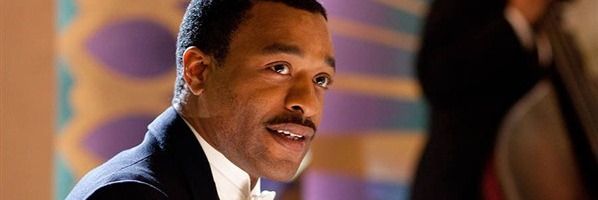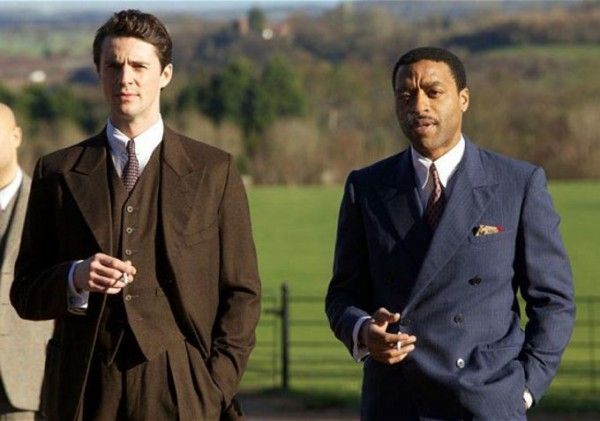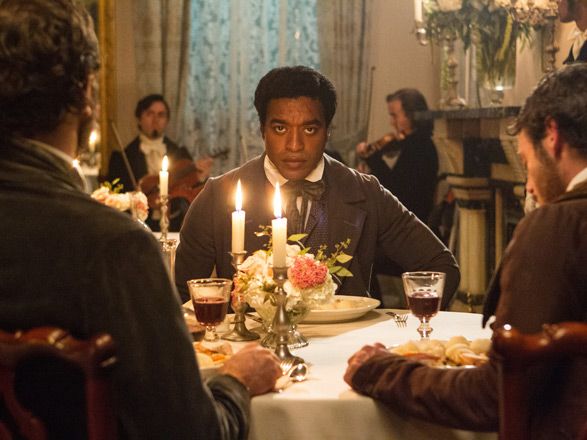The original mini-series Dancing on the Edge is a tremendously compelling story about a group of black jazz musicians called the Louis Lester Band, in London during the early 1930s, as they begin to rise to stardom while performing at various elite social gatherings hosted by aristocratic society. The city’s more progressive socialites took the band under their wing, until debonair band leader Louis Lester (Chiwetel Ejiofor) suddenly finds himself entangled in a murder conspiracy, which clearly shows him who his true friends are. From writer/director/executive producer Stephen Poliakoff, the mini-series also stars Matthew Goode, Jacqueline Bisset, John Goodman, Janet Montgomery, Angel Coulby, Tom Hughes, Wunmi Mosaku and Joanna Vanderham.
During this recent exclusive phone interview with Collider, actor Chiwetel Ejiofor, who gives a remarkable performance as the story’s lead, talked about how he got involved with the project, learning the entire arc for his character before they started shooting, the emotional impact playing a character like this can have on you, what attracted him to this role, and how brilliant it was to work with such a gifted cast of actors. He also talked about what it’s like to receive so much Oscar buzz for 12 Years a Slave, how he’s working with director Joe Wright to bring A Season in the Congo (which they just did on stage at The Young Vic) to the big screen, that he has no conscious plan for his career, and how he’d love to do another romantic comedy (his one and only was Love Actually). Check out what he had to say after the jump.
Collider: How did you get involved with Dancing on the Edge?
CHIWETEL EJIOFOR: It was incredibly straightforward, actually. I met (writer/director) Stephen Poliakoff in London and we had a really great lunch and a long time about it, in general terms. I hadn’t read it, at that point. And then, he sent me two episodes and explained where the story was going. I’ve been a fan of his work for so long, and I just love the way that he writes and the originality of his stories and storytelling. I was hooked, after the first couple of hours of it. I was just thrilled to come on board, really, and got increasingly excited, as he sent me the episodes, before we started shooting. It was a great way into it, and a great way to start the journey.
Did you eventually get to read all of the scripts before you starting shooting?
EJIOFOR: I think they all came in before we started shooting, with some minor changes. I can’t remember how long before. I’m sure it wasn’t that long, from getting the last episode to the beginning of shooting. But, it was great to get the overall arc. Sometimes people don’t actually do that, and whilst they’re shooting, they’re figuring out where it’s going. I think this was such a complete story in his mind, and in the way that he wrote it. Thematically, it’s just about so many different things, and there were so many different ways to explore it that it was exciting, as a process. We were able to have quite an involved rehearsal period, which was a real treat, actually. It doesn’t happen that often, that you can have a few weeks on a television project.
Did this feel much more like a film than a television project?
EJIOFOR: Yeah. It had that space that you can have in film sometimes. You have space for character, as well as anything else. It’s not plot-driven, in that way. Sometimes television can just jump from one bit of plot to the next, and the words fill in the in between. But this really had a scope to it, I thought. Also, the way that he chose to shoot it and the era that he was setting it in allowed it to have this real breadth and expanse. It’s such a large time, the ‘30s in London, where everything was so big and, for those who were wealthy, there was so much wealth. Really capturing those old ballrooms and country manners, both of which don’t exist in that way anymore, was an extraordinary scope and ambition for Stephen.
When you do a film like this and are telling a story like this, or even something like 12 Years a Slave, does it have an emotional effect or impact on you?
EJIOFOR: Definitely. You have to get caught up in it all, as a person. It’s hard to tell the story, if you’re not involved yourself, emotionally. With Dancing on the Edge, with 12 Years a Slave, and with Half of a Yellow Sun, they were all stories that I felt I could connect with very deeply and understand the positivity that’s there, as well as the darker side to it all. With Stephen, who dances quite mercurially with those two things, you’re never 100% sure about characters and their motivations, and then they reveal themselves over time. Most of the people in it are wearing a mask of some sort and they’re playing a chess game with each other. Even though that’s a reflex, it’s almost an instinct to do that, as opposed to the Machiavellian, conscious choice.
There’s a definitely diversity and complexity in the roles that you do. What was it about Louis Lester that spoke to you and made you want to add him to the list of characters that you’ve played?
EJIOFOR: I feel like the first thing was Stephen. I loved the way he wrote the character. I loved the way that he uncovered this little known area of historical record and really expanded on it. Initially, my first instinct was that I just found Louis Lester fascinating. I just thought he was somebody that I’d never seen before. So, from that perspective, I wanted to understand him and get under his skin, a little bit. And then, I was intrigued by the way he viewed the world. I just loved playing a character that had so many seemingly opposite things going on. He had this reserve, a quiet and a humility, but also a real naked ambition and a desire to achieve this success and this fame. He was somebody who, to me, was very emotional, in the sense of his music. He was open with his music and open with his generous spirit, but was almost hiding behind different masks and wasn’t really prepared to show his cards to people. He just felt like a bundle of contradictions and nerves, in that way, but all played underneath this very calm surface, which I thought was fascinating. There was this very still water that was rippling underneath.
There’s a point made, several times, about how calm Louis Lester is and how they don’t understand how he’s always so calm. Was it challenging to keep your emotions in check, like that?
EJIOFOR: I always thought it was something about a person’s psychology. Different people approach the universe in different ways, but they also approach their own expectations in different ways. Here’s somebody who always thinks that the rug is going to be pulled out from under his feet, at any given moment, probably because of his own past with both of his parents dying in a flu epidemic in the First World War. There’s that sense that everything can change. Everything is always in flux. He had experiences in the merchant Navy, traveling the world. He’s seen great things, but also terrible things. He’s aware of the volatility of life. Dealing with that, you develop a persona that has a very even temperament. You find yourself dealing with circumstances by approaching them in a very sober way, and find that there’s a real strength in that. I think that’s what he was able to imbue into Stanley (Matthew Goode), a little bit. It’s a very strong place to be, even when challenged. So, to answer your question, I just felt like, if I stuck with Louis, in that way, then maybe he had a point. In a way, I think that’s what Stephen was writing about. People have different ways in which they approach life. Louis Lester’s way is sometimes the harder way to do it, but also a very powerful way.
When you read this script, were you more surprised about the people who turned their backs on him, or the ones who actually helped him?
EJIOFOR: I think I was surprised by both things, actually. Also, I was surprised by his reaction to those different things. I felt that the choices that he makes, and the choices that people make towards him, are all based on their individual circumstances. But the levels of betrayal, because they cut deep and some of them are a complete shock, you feel that they just had a truth to them. There’s an honesty about the nature of people’s experiences and what they are prepared to do or feel that they have to do, in order to get to the next point in their own lives, or to save their own family. So, there was always a sense of foreboding in this very topsy-turvy world that he finds himself in. When the dominoes start to fall, I found that it was definitely surprising, who turned and who stayed and who disappeared.
What was it like to work with this great ensemble of actors?
EJIOFOR: It was brilliant. Everybody really brought their characters to life, to me. You always pinch yourself when you walk onto a set, especially when you’re in a period film of this nature, and one that’s not really been uncovered that much, in terms of cinema. This is a very specific world, and everybody is bringing this real quality of authenticity to it and ownership of it. That’s thrilling to work off and work against. And the way in which myself and Matthew [Goode] built the dynamics of our characters was really interesting. There’s this very deep affection that develops with Louis and Janet Montgomery’s character, Sarah, that really blocks out everything else. These are two people who are really able to find each other, among all this other stuff, and really remove the masks, however briefly, to actually find this real human connection. I just felt like everybody had really come into the process with this real sense of the strengths of the piece and really brought everything to it.
What’s it like to already be hearing so much Oscar buzz for 12 Years a Slave?
EJIOFOR: It’s great. I’m deeply, deeply proud of the film, so in that sense, it’s always great that people are responding so warmly to it. I’d like people to just make up their own minds about it. It’s always slightly nervy when people talk about hype or heat or buzz because you feel it’s overrun the experience for someone who wants to go in and watch the film. But having said that, it’s incredibly exciting for the film to be received in this way. I hope people see it.
Do you have any idea which project you’re going to do next?
EJIOFOR: I don’t know 100%, actually. I’m looking at a couple different things and it’s all very exciting. But at the moment, I’m just traveling around and opening Dancing on the Edge and 12 Years. I’m enjoying that, right now, and enjoying being present in that. I’m looking forward to people seeing those projects.
And don’t you still like to work in the theater when you can?
EJIOFOR: Yeah. I just finished doing A Season in the Congo at The Young Vic with Joe Wright, about Patrice Lumumba, which was an extraordinary experience. I traveled out to research the piece in the Congo, in the eastern part, and met the surviving members of Patrice Lumumba’s family. I was just astounded by the place and its history. So, putting on a play about that was incredible. It’s been a very enriching last 18 months. I’m just taking that all in.
Hasn’t there been talk of turning that into a film, as well?
EJIOFOR: Exactly, yeah. We’re still working out the logistics of that, but it’s in process with Joe Wright. It’s really exciting. When it comes together, I think it’s going to be a very deeply unique experience, not just in terms of doing it, but in terms of seeing it. I’m not sure that there’s anything that’s comparable, in the sense of the actual nature of doing something like this, in Conchasa, with the people there and their connection to that specific history in the country. It’s just an incredible opportunity.
When you do a series of roles like this, that really can have such an impact on you personally, does that affect how you look at the things you want to do next? Does it change how you want to approach your career?
EJIOFOR: I don’t know. I never really had a conscious plan of anything. I try to just be open to what the next experience is and how it makes me feel, just reading a project, or trying to get involved with a project, or thinking about a project, and what particular emotional flavor that brings. To me, it’s never really about planning the next thing, or the career arc. It’s about investigating how I feel, from project to project, and finding things that I haven’t explored and what that would be like. And then, there are things that come out of the blue that excite you and exhilarate you and interest you. It’s just about being open to whatever happens.
Is there a type of character or a genre that you haven’t worked in yet, that you would love to get the opportunity to do?
EJIOFOR: I don’t know. I love a good romantic comedy, myself. I’ve only ever had one opportunity to do a romantic comedy, with (writer/director) Richard Curtis for Love Actually, years ago. That was my only experience with it. I’ve always found it a really fascinating genre that I haven’t explored. Maybe I’ll do something like that next.
Dancing on the Edge airs on Saturday nights on Starz.



